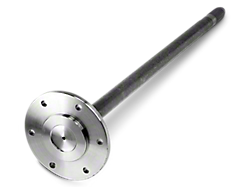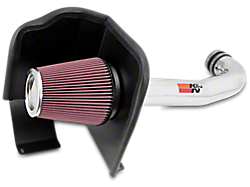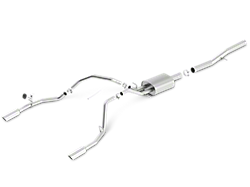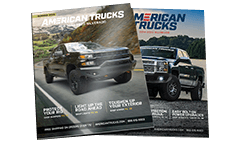How Your Silverado 1500 Gearing Works
In layman's terms, your gears consist of a ring and pinion kit, located inside your rear differential, that is responsible for turning your wheels. Gears are part of the rear drivetrain of your car, which consists of your axles, a power transfer component, gear housing, and the ring and pinion kit.
Gears transfer power to the tires via the driveshaft, which must rotate a certain amount of times to power your tires’ rotation. The amount of times the drivetrain must rotate to turn the wheels is determined by your rear axle ratio, or the number of teeth present on the ring and pinion.
Essentially, a 3.73s gear ratio means that a drivetrain must turn 3.73 times to move your tire one full rotation. Changing your gears will affect how much torque and acceleration your Silverado will receive at certain RPMs.
Axle ratios and tire diameter are directly responsible for your final drive ratio. Increasing or decreasing the diameter of your tire, without changing gears, will result in a poor final drive performance (e.g. acceleration, fuel economy, and torque).
What Does a New Set of Gears Provide my Silverado 1500?
If you do choose to install a lift kit or new tires, then it’s prudent you also change your gears to maintain the final drive ratio. Ideally, you’ll want to decrease your gearing ratio to compensate for smaller tires. This is strangely known as taller gearing.
Taller gearing is optimal at high speeds, providing better fuel economy and more top speed. Lower gearing provides better top speeds because it requires less rotations at max rpms to power your vehicle, resulting in better top speeds. To test this equation, you’d simply divide your max RPM by your gear ratio to determine final wheel speed.
On the other hand, increasing your gearing ratio is referred to as shorter gearing. These are ideal for larger tires because shorter gearing provides greater acceleration and more low end torque for your Silverado. Larger tires weigh more and increase rotational mass, meaning your driveshaft will have to work harder to compensate. Shorting gearing gives your axles more power and takes stress off of your drivetrain.
Taller gearing provides a higher top speed and better fuel economy while shorter gearing provides more low end torque and better acceleration. Taller gearing is better for daily driving especially if you are planning on doing a lot of highway driving or are simply going to run small tires. Shorter gearing is needed for large tires and also aids in rock crawling by increasing low end torque.
Why Regear Your Silverado 1500?
Changing your gearing helps to offset any modifications you make to your Silverado. Too tall of gearing and you will lose power. Making your gearing too small could significantly diminish your fuel economy. We offer Yukon Gearing that’s designed to fit any rear differential and add performance to your Silverado.
If you desire more power than you’ll need larger tires for your Silverado. Since acceleration is directly affected by torque, you’ll need a higher gearing ratio that provides more low end torque and thus greater acceleration. This will also give your Silverado more towing power, although GM does state it could result in a 1 mpg drop in fuel economy.
Aside from older first generation Silverados, your Silverado 1500 will most likely feature a 6 or 8-speed automatic transmission system. Adjusting the static weight of your vehicle or its height could be dangerous for an automatic transmission without proper gearing. Automatic transmissions are heavier and have shorter gears due to the system’s intricacy. Changing your gear ratio or the amount teeth in your gears will affect your speedometer and shift points. This could result in excess slippage and damage value internal components inside your transmission.
Adjusting with the gears will help solve this, but there also some other methods you can use:
- Reprogramming the tuner
- Installing a speed calibrator
- Installing an adjustment gear
Gearing is a tricky game. Shorter gear ratios increase power at the expense of fuel economy. Most trucks and Silverados feature either a 3.73s gear ratio or a 4.10s, although we offer different gearing as low as 2.73s and as high as 5.57s.
Consider what type of driving your doing. Shorter gearing provides greater acceleration at low speeds with better traction from your tires. The sacrifice between power and top speed is not too significant that it would persuade you to avoid a shorter gear set.
Notes on Silverado 1500 Ring and Pinion Gear Installation
Changing your ring and pinion gears is very complicated and can cause significant internal damage to your transmission if not done properly. If you have a manual transmission or are looking to adjust your gear ratio then we’d suggest talking to a professional before attempting to install. While seemingly easy, we do not recommend installing a gear set yourself.
There’s also the problem of replacing your bearings if your Silverado is over 30,000 miles as they can wear onto your old gears over time. Under 30,000 miles, then you can simply swap out your gears without worrying. After new gears are installed you’ll want to change your rear’s oil with a synthetic blend to give it the best performance.
Shop All Drivetrain Parts for Trucks
Fitment Includes
- 1999, 2000, 2001, 2002, 2003, 2004, 2005, 2006, 2007, 2008, 2009, 2010, 2011, 2012, 2013, 2014, 2015, 2016, 2017, 2018, 2019, 2020, 2021, 2022, 2023 and 2024 Silverados
- LT Z71, LTZ, Z71, LTZ Z71, WT, Work Truck, XFE, Hybrid, Lingenfelter Reaper, Custom, Special Ops Edition, High Country, LS, LT Silverados
- Engines: 4.3L Vortec V6, 4.8L Vortec V8, 5.3L Vortec V8, 5.3L Flex-Fuel Vortec V8, 6.0L VVT Vortec V8, 6.2L VVT Vortec V8, 4.3L EcoTec3 V6, 5.3L EcoTec3 V8, 6.2L EcoTec3 V8 Silverados
*Please see Silverado parts pages for any exceptions.






